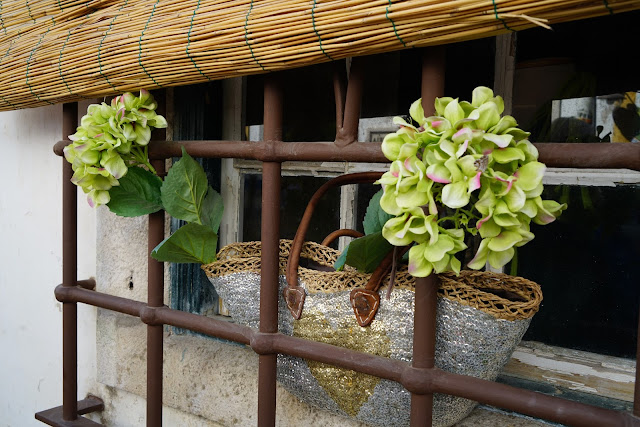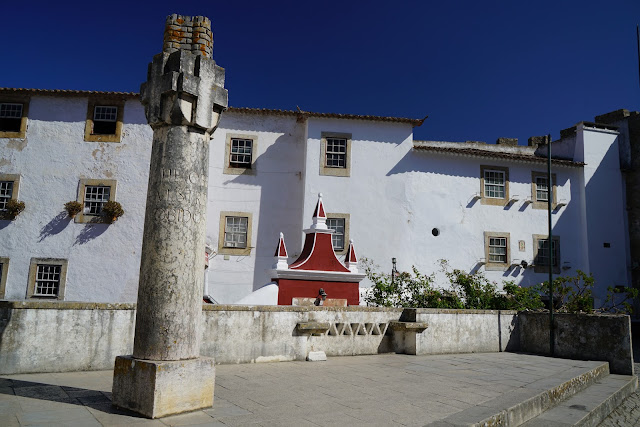After lunch at a Fatima restaurant, we set out for our next destination,
Obidos, a small town in west Portugal which had been a settlement even in
the late Paleolithic age and since been occupied successively by the early Celts, Romans,
the Visigoths, Moors and now Portuguese and had been trading with the Phoenicians for hundreds of years.

Our first glimpse of the little town of slightly more than 3,000 people,
Óbidos and a total of more then 11,000 counting the surrounding areas.
The town probably got its name from the Latin word "oppidum" meaning
"citadel" because it had been used by the Romans as a fort. The archaeological
evidence indicated that there was once a forum, some Roman baths and
other building under the settlement.The Romans left around the 5th century and the place was taken over by the Visigoths. Then like the rest of the Iberian Peninsula, the town was overrun by the Moors of north Africa who built a fort on its mountains In 1148, it reverted to Portuguese control under King Afonso Henriques and in 1195, the town got its charter. In 1210, King Afonso II gave this village to Queen Urraca since which time until 16th century, Obidos has so often been patronized by various Portuguese queen consorts that it was called "Vila das Rainhas (meaning Queenstown) because of donations by them..


A view of its castle full of Moorish features (Photo From Wikipedia)
During the reign of King Denis I, the castle and walls of Óbidos were
remodelled: its limestone and marble structure was strengthened and
elaborated and in the 14th century, King Fernando added the its castle
keep.

As the road up the castle can be a bit too strenuous for older folks and people with leg problems , some carts are available for hire at entrance to the little hillside town.


The local pharmacy

Approaching the entrance to the castle

One of heavy wooden doors to the castle,. The main gate is right to its left.

flowers everywhere

elaborately tiled azulejo wall decorations of the underside of the castle keep


Details of the azulejo ceiling and wall decorations

an old musician at the corner playing to kill time or if lucky, got a few Euros from appreciative foreign tourists

There'll be small concerts right through April to November featuring works by Villa-Lobos, Vivaldi, Ravel, Mozart and Beethoven by various members of the Lisbon Orchestra

From time to time, the path would widen according to the lay of the land.

There's a coach service for interested tourists


They do have customers

But I enjoy the chance to stretch my legs

An old Roman column, the town's totem pole

many of the paths lead further uphill to various local residence

The village bakery

which also sells different kinds of beverages

A beautiful wrought iron signboard

\
Small clean restaurant with all white table and chairs upon huge black and white floor tiles

All kinds of pies, cakes, tarts and pastry

Many houses have got black wrought iron fixtures against white walls bounded by yellow or blue

All kinds of wines or local liqueurs on sale in thoughtfully designed bottles

cheap pottery in lively bright colors

public space are not wasted


The happy young store keeper

The Ginja in all kinds of specially designed bottles

A small store selling all kinds of souvenirs and handicrafts

There's also a ladies fashion boutique selling colorful summer dresses and scarves.

Various local handicraft pottery on racks, shelves or

or simply hung on the wall

The windows are small

but the flowers bloom madly in the summer heat

some colorful plates

wines and liqueurs

What an ingenious idea for a multi-purpose display rack!

.

Solar geometry

An exotic bar with a Latin name: "Petrarum Domus Bar, Obidos" . The name probably means "Stone House" on account of the granite column and the stone lintel.

Granite door and window frame seem the rule here.

A shop name betraying its Moorish origin: "Casa Mourisca"

A very colorful house in a street carved by the shadow of the afternoon sun.

An old church

There're lots of overlaps in what the shops sell

I like the gay colors of their crockery toys and utensils

The narrow streets are lined with all kinds of shops with all kinds of stuffs: tiles, cups, statues, cartoon animals and wooden handicraft items
and all kinds of bells and other hung decorations to delight the ladies

There are all kinds of bars around

Nostalgic vinyl records and Portuguese guitars

What a way to decorate a wall.! The bar/restaurant owners must have put a lot of thought into making his place unique. Never saw anything like that before.

Colorful fishes on the wall

Are these samples of what's called "naive art"?

Wrought iron handicraft.

Why is this Loja do Lagar (winepress lodge), done in checkered azulejos (tin-glazed tiles) selling divers artisanal items?

At the corner of the walls in front of the local church is an advertising sign with a shield and a sword pointing to a tapas bar restaurant with Medieval decor, one of the best restaurants in that little town

A coach parked in front of the Praça de Santa Maria, bearing the same name as the church located there, the Igreja de Santa Maria, the principal church of this historic town.

The front entrance is done in 16th C style. The site used to be a mosque. But after D Afonso Henriques retook control of Obidos in 1148, it was turned into a church. On 15th August, 1441, the 10-year-old Infante D Alfonso (who later became D Alfonso V) married his cousin Princess the 8-year-old D Isabel of Coimbra! Dynastic marriages were often purely political. Whatever the reasons for such arranged marriages, there's placed inside here a 16th century tomb of D. João de Noronha, who was alcaide or commander of Óbidos, said to be a masterpiece of Renaissance tomb sculpture, attributed to João de Ruão. .

Candles burning on huge trays against the azulejo tiles


The altar is decorated with beautiful paintings on various religious themes

Various stages in the life of the Holy Mother

Various stages in the life of the Holy Mother

One of the paintings depicting the power of the Holy Mother over evil with the assistance of angels

One of the blue and white azulejo tin-plated tiles in the church


One of the blue and white azulejo tin-plated tiles in the church

The Holy Mother with infant Jesus

The Mother of Sorrow

The Mother of Sorrow
Jesus rising from the dead and ascending to heaven

The Balcony and ceiling

The ceiling

A notice at the entrance urging people to worship Jesus Christ

Young lovers oblivious of everything except their irrepressible passion.

The corridor with stones paved to similar sea waves.

Three huge olive trees in the square.

oranges for sale; shall I take some?

Some people having a leisurely snack there
Another side to the square

oranges can serve as decoration too!

A penny and farthing serving as a flower stand.

The streets are narrow. This one leads to the other church in town, the San Pedro.

another stall selling the popular ginja.

All kinds of stuffs on sale here. The ladies street in Obidos.
Each
July Óbidos castle hosts a traditional 'Medieval Market'. For two weeks
the castle and the surrounding town would recreate the spirit of medieval
Europe with flowing banners and heraldic flags, hundreds of entertainers and stall holders dressed as merchants,
jugglers, jesters, wandering minstrels, soldiers and more. Visitors can
shop at the traditional handcrafts fair or watch medieval shows, horse
displays and a costumed parade that winds its way through the streets.
There are also displays of jousting knights and armed combat. Spit
roasted hog, hearty soups, rabbit, lamb, cod, quail, sausages and other
grilled meats are just some of the many medieval style meals on offer
from dozens of "taverns" and stalls spread throughout the market.
Tourists can drink from pewter tankards and eat from wooden trencher.just like in the good old days...

Another bar

another narrow lane leading uphill

The road leading to an abandoned church.

A road junction

What magnificent blooms !
All walls are thick with flowers

I like the way they use yellow in this little town

They blend in so well with the blue skies here.

Ticket booth for entering the Medieval castle

The castle is built upon limestone

It's difficult to tell where the natural rocks end and the artificially laid stones begin

The toilet

a view of the castle

There are narrow steps up the parapets of the castle wall from which one gains a spectacular view of the surroundings

Endless fields

in the rolling country
and the forests on the far side

The steep castle walls

Various roads converge

Another part of the castle wall

One can see the road leading up to the castle

There are various houses inside the castle too

One can see the closely packed house in the the town below from the castle wall

Another view of the small Medieval town

Trees hug the castle walls almost as tall

The narrow cobble-stoned streets below

The escape tower

The escape tower entrance

some outdoor ovens for an event inside the castle

These are presumably base supports for the platforms for the annual summer Medieval Market Fair just terminated

Another view of the castle wall: the steep steps without guard rails going up: that's where I took the photos of the surrounding areas

One of the brightly colored booths for the summer festival

Behind the toilet are more booths

The escape tower

coming down the castle

There are many tourists from other parts of Europe

This is a couple from nearby Sevilla in southern Spain

Beautifully crafted cast iron lamp
Cming towards the arch

Passing under the arch, the sun already less strong

Once again we met these crazy flowers blooming like mad

What a way to decorate one's window: a basket for a flower pot

The totem pole of the little town

Half the road are now in shadows

Metamorhosis? From history to profit?

a post box

another colorful wall decoration

Lines and shadows

Sipping a glass of wine in the shades?

Believe it or not, this book store used to be a church!

Spiral steps leading up.

The proof

more proof

This must have been one of the side altars

The beautiful door leading to the office

Wooden swords and bows bespeaking its bloody past

But not everything is so.

More flowers

blooming wherever they can find the sun

Ah, a hotel

with plants ringing its eaves

plants seek whatever support they can get

Alphabets, anyone?
Everything that a tourist can imagine buying

These bring back memories of my childhood
A woman must leave an impression before it's too late

A blend of nature and culture

How pleasant to shop here

At the back of the car park, the ancient Roman aqueduct is still intact

A nice spot to park the coach

The castle from the car park

The guardhouse at the entrance to the car park

Nearly 2000 years and still standing









沒有留言:
張貼留言